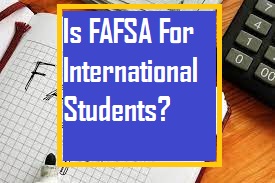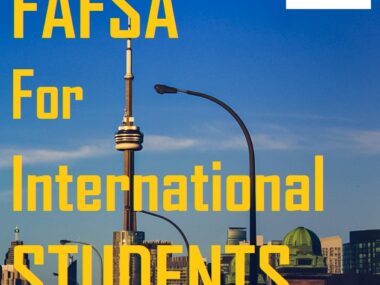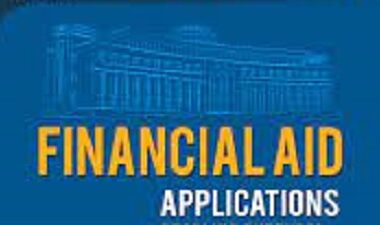For international students, one of the most pressing questions when applying to study in the U.S. is financial aid. In particular, many wonder: “Is FAFSA available for international students?” FAFSA (Free Application for Federal Student Aid) is crucial for U.S. students seeking federal funding for their education, but does it apply to international students as well?
In this article, we will explore FAFSA eligibility, how it impacts international students, and the alternative financial aid options available for those studying in the U.S. or abroad. Whether you are a student from Canada, Europe, Asia, or any other part of the world, this guide will help you navigate the financial aid process.
What is FAFSA?
FAFSA stands for Free Application for Federal Student Aid. This form is used by U.S. students to apply for federal financial aid, including:
- Federal Pell Grants (need-based grants)
- Federal Student Loans (subsidized and unsubsidized)
- Federal Work-Study Programs (part-time jobs to help pay for education)
FAFSA is administered by the U.S. Department of Education and helps determine how much financial assistance a student qualifies for based on their family’s financial situation.
Can International Students Apply for FAFSA?
The short answer is: No. FAFSA is designed for U.S. citizens and eligible non-citizens. International students, who do not meet the eligibility requirements for federal aid, are generally not eligible to apply for FAFSA. The U.S. government’s financial aid programs are meant to assist students who are U.S. citizens, permanent residents, or those who meet specific visa criteria.
Who is Eligible for FAFSA?
In order to receive federal financial aid through FAFSA, students must be one of the following:
- U.S. citizens or U.S. nationals
- U.S. permanent residents (Green Card holders)
- Eligible non-citizens, such as:
- Refugees
- Asylees
- T visa holders (victims of human trafficking)
- Cuban-Haitian entrants
If you do not fall into one of these categories and are an international student, you cannot apply for federal financial aid through FAFSA.
Why is FAFSA Not Available for International Students?
The U.S. government’s federal financial aid system, including Pell Grants, federal loans, and work-study programs, is designed for students attending accredited U.S. institutions. Since international schools do not participate in Title IV funding (the federal law that governs these programs), the U.S. government cannot extend these benefits to international students studying at non-U.S. institutions.
Can International Students Receive Federal Aid for U.S. Study Abroad Programs?
If you are a U.S. student participating in a study abroad program that is affiliated with a U.S. university, you may be able to use your FAFSA eligibility. Some U.S. universities allow their students to apply federal aid to study abroad programs. Here’s how it works:
- If the study abroad program is part of a U.S. school’s official program, the student may still receive federal financial aid, such as Pell Grants or federal student loans, even if they are studying at an international school.
It’s crucial to check with the U.S. university’s study abroad office to confirm eligibility for federal aid in such programs.
What Are the Financial Aid Alternatives for International Students?
While FAFSA isn’t available for international students, there are still many other ways to finance your education in the U.S. or abroad. Below are some options for securing financial aid:
1. Scholarships for International Students
One of the most popular funding options for international students is scholarships. Many organizations, foundations, and U.S. universities offer scholarships specifically for international students. Here are a few well-known programs:
- Fulbright Program: Offers graduate students and professionals scholarships to study in the U.S.
- Joint Japan/World Bank Graduate Scholarship: Provides funding for students from developing countries.
- AAUW International Fellowships: Offers fellowships for women from outside the U.S. to pursue graduate education.
Additionally, websites like Scholarships.com and Fastweb list numerous scholarships specifically for international students.
2. Private Loans for International Students
While federal student loans are unavailable to international students, private student loans are a viable option. Many lenders offer loans specifically for international students studying in the U.S. or abroad. Some well-known providers include:
- Prodigy Finance: Offers loans for international students pursuing postgraduate education.
- MPower Financing: Provides loans without requiring a U.S. co-signer for students from eligible countries.
You may need a creditworthy co-signer if you don’t have a U.S. credit history.
3. The CSS Profile for Institutional Aid
Some universities use the CSS Profile to determine eligibility for institutional financial aid. Unlike FAFSA, the CSS Profile is available to all students, including international students. Some highly selective institutions require the CSS Profile to offer scholarships, grants, or work-study opportunities to international students.
4. Government-Funded Aid in Other Countries
Many countries offer financial aid programs or scholarships for students who want to study abroad. Some notable programs include:
- Chevening Scholarships (UK): Fully funded scholarships for international students to study in the United Kingdom.
- Endeavour Leadership Program (Australia): Provides funding for students from around the world to study in Australia.
5. On-Campus Employment
In the U.S., international students on a student visa (F-1) are allowed to work on-campus up to 20 hours per week during the academic year and 40 hours per week during school breaks. On-campus employment can help cover living expenses and reduce the overall cost of your education.
How to Maximize Your Financial Aid Options
- Apply Early: Start applying for scholarships and financial aid as soon as possible. Deadlines for scholarships and financial aid programs can be several months before your intended start date.
- Check School-Specific Financial Aid: Many universities offer institutional scholarships that are not based on FAFSA eligibility. Check with the university’s financial aid office for details.
- Maintain Good Academic Standing: Scholarships and some forms of financial aid often require students to maintain a high GPA. Keep your academic performance strong to ensure eligibility for these programs.
FAFSA is a valuable tool for U.S. citizens and eligible non-citizens, but unfortunately, international students are not eligible for federal financial aid through FAFSA. However, there are numerous alternative financial aid options available for international students, including scholarships, private loans, and government-sponsored programs from other countries.
By understanding your financial aid options and starting early in your application process, you can successfully fund your education and make your dream of studying in the U.S. or abroad a reality.










